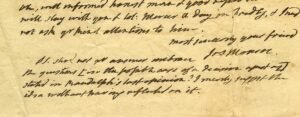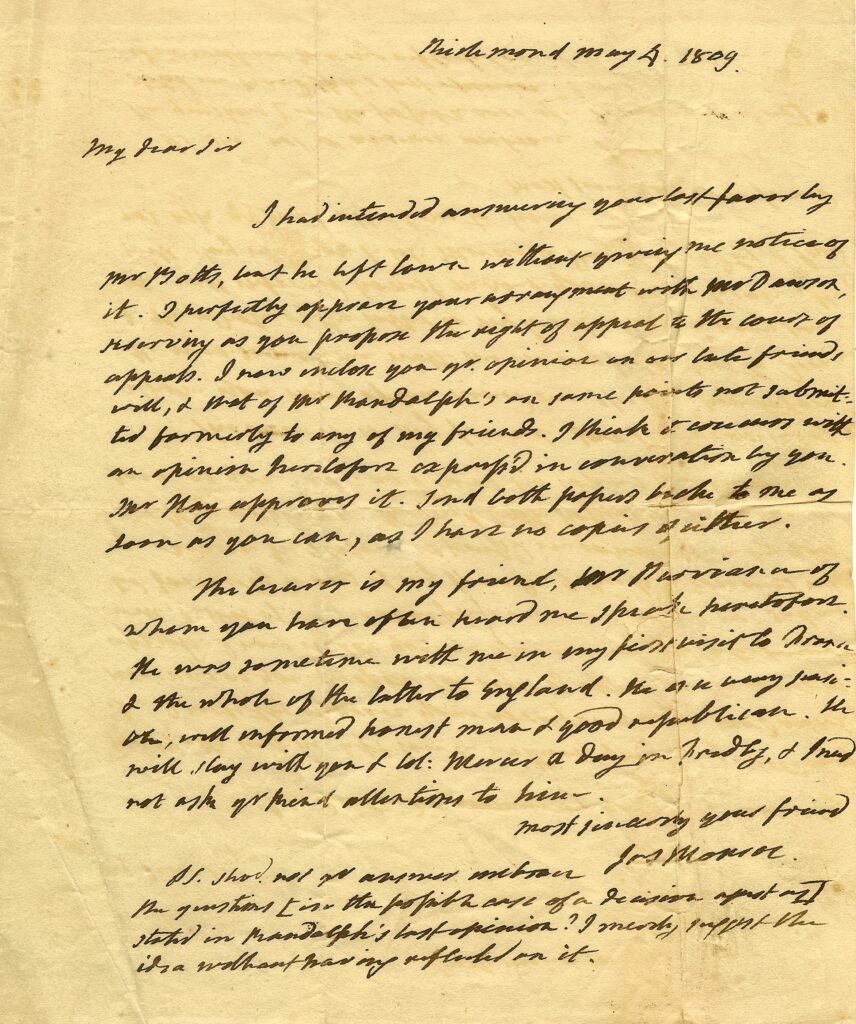JAMES MONROE WRITES TO HIS FELLOW REPUBLICANS AS THE WAR OF 1812 APPROACHES
MONROE, JAMES. (1758-1831). Fifth President (1817-1825). Autograph Letter Signed, “Most sincerely your friend Jas. Monroe.” One very full page, quarto. Richmond, May 4, 1809. To “My dear sir.” Monroe writes:
“My dear sir, I had intended answering your last favor by Mr. Botts [?], but he left town without giving me notice of it. I perfectly approve your arrangement with Mr. Dawson, he serving as you propose the right of appeal to the court of appeals. I now enclose you yr. opinion on our late friend, will [?], & that of Mr. Randolph’s on some points not submitted formerly to any of my friends. I think it concurs with an opinion heretofore expressed in conversation by you. The Navy approves it. Send both papers back to me as soon as you can, as I have no copies of either. The bearer is my friend Mr. Par [?] of whom you have often heard me speak heretofore. He was sometimes with me in my first visit to France & the whole of the latter to England. He is a very serviceable well informed honest man & good republican. He will stay with you and Col. Mercer a day in Bradley & I need not ask yr. kind attentions to him. Most sincerely your friend, Jas. Monroe
P.S. Shall not your answer embrace [?] the questions [is the possible case of a decision against me] stated in Randolph’s last opinion? I merely request the idea without having reflected on it”

James Monroe, Minister to both England and France and negotiator of the Louisiana Purchase, here writes to a fellow Republican as the nation quickly approaches conflict with Britain. While relations between France and the United States had improved since the cessation of the Quasi-War with France in 1800 (leading each nation to offer the other Most Favored Nation trade status) and the Louisiana Purchase (negotiated by Monroe in 1803) tensions remained high between the U.S. and Britain. John Jay’s 1795 treaty with Britain was opposed by many Republicans, including Monroe, who felt that the any treaty which still allowed the capture of United States ships trading with France did not do enough to protect the United States’ trade rights. Edmund Randolph, Secretary of State at that time, went so far as to resign his post over the issue. While Colonel John Francis Mercer, who had served under Generals Lee and Lafayette during the Revolutionary War, and John Dawson, a lawyer and Congressional representative for Virginia, did not react so dramatically both were also opponents of the Jay Treaty. Compounding the problems posed by the Jay Treaty was the passage of the No Intercourse Act in March of 1809. This nearly unenforceable act lifted all embargoes on American ships except those bound for France or Britain. Aimed at damaging the economies of these two countries, the act instead weakened the United States economy due to the lack of markets for U.S. goods and contributed to the outbreak of the War of 1812.
$9000.00
